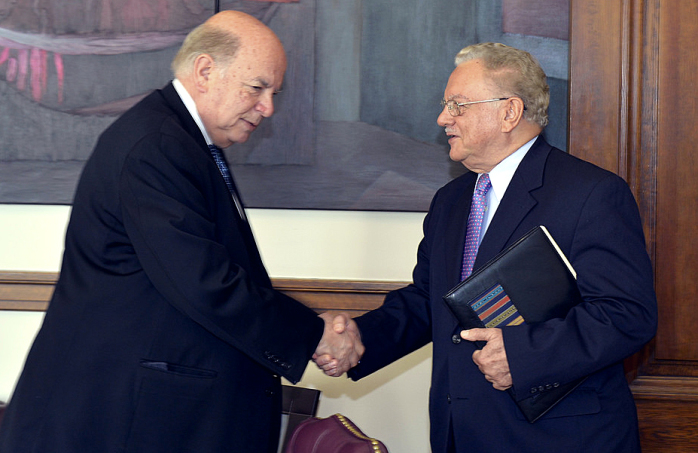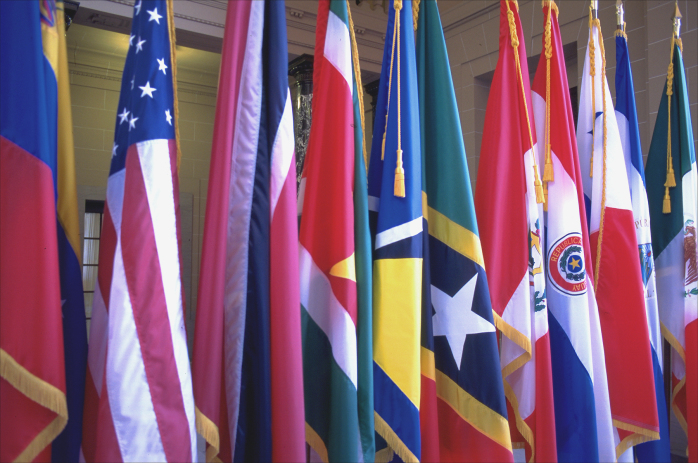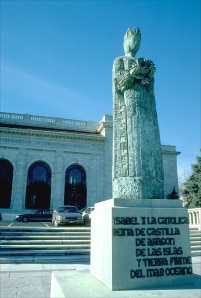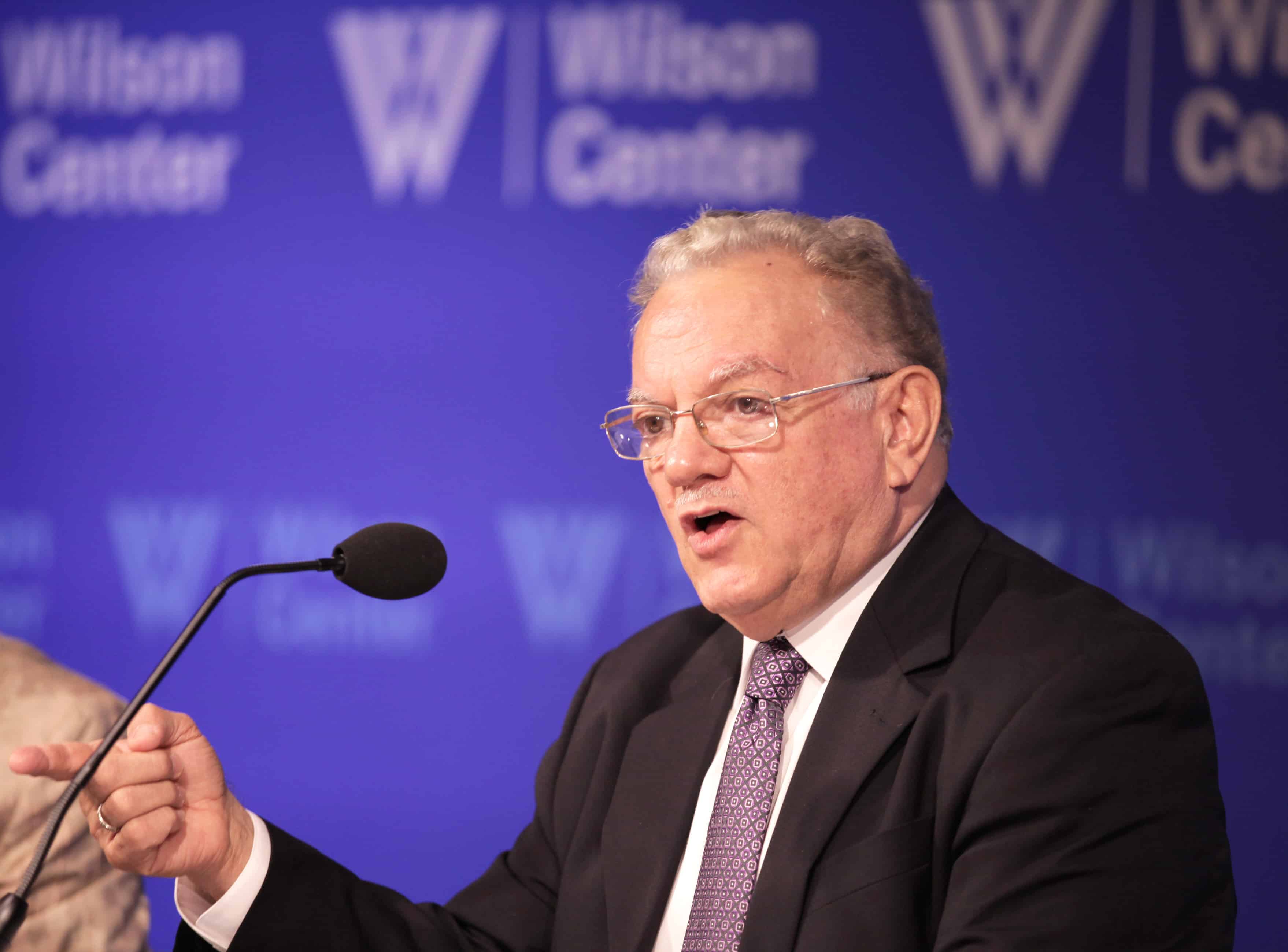See also: Inter-American Dialogue honors Guatemalan businessman, civic activist Salvador Paiz
WASHINGTON, D.C. – Guatemala’s Eduardo Stein Barillas vowed to “clean up the mess” at the Organization of American States if he’s elected secretary-general of the politically divided, cash-strapped regional body.
Stein, a former foreign minister and vice president of Guatemala, is vying for the top job against Uruguayan Foreign Minister Luís Almagro. A third candidate, former Peruvian Foreign Minister Diego García Sayán, dropped out of the race last month due to what he said was lack of support from the Peruvian government.
Stein, 69, hopes to succeed José Miguel Insulza as OAS chief when the Chilean diplomat’s term expires in May 2015. Elections will take place in March or April.

Pulling no punches
Speaking earlier this month at the Woodrow Wilson International Center – a Washington think tank – Stein didn’t pull any punches about the difficult road ahead.
“There are questions not only about what candidates for the post are proposing to face these formidable challenges, but also deeper questions about whether reform of the organization is still really possible and feasible – and if whoever gets elected will really be able to pull the organization out of this mess,” said Stein, who served as Guatemala’s foreign minister from 1996 to 2000, and vice president from 2004 to 2008.
“The OAS is in dire need of profound structural reform,” said the elder statesman. “There is a severe financial crisis in the organization. The original Cold War blueprint doesn’t cut it anymore.”
Recommended: OAS chief urges new approach to failed ‘war on drugs’
U.S. taxpayers finance about 60 percent of the struggling body’s $83 million annual budget. Canada, Mexico and Brazil account for another 38 percent, while the remaining 32 countries fund the remaining 2 percent.
But Stein added that “no new secretary-general can work miracles on his own. Without full political and financial support, reforms will never come to be, and whoever gets elected to the post will be drowned in fruitless efforts to salvage a languishing organization that – as one foreign minister put it, privately of course – will become as extinct as the dinosaurs.”
He also called for the elimination of OAS mandates that have long ago outlived their usefulness, noting that “there are 757 existing mandates in the organization without a proper budget to honor them. This will be a major institutional disaster if we don’t get our act together.”
Stein, who was introduced by Cynthia Arnson, director of the Wilson Center’s Latin American Program, is used to formidable challenges. In the late 1980s, he participated in the Esquipulas Accords aimed at bringing peace to Central America. He was also active in the San José Dialogue between Central America and the European Union, and played a critical role in the peace talks that brought an end to Guatemala’s civil war in 1996.
Stein was also chief of an OAS electoral mission to Peru in 2000 that found then-President Alberto Fujimori’s re-election to be fraudulent; in Honduras, he presided over the Truth and Reconciliation Commission formed after the controversial 2009 ouster of President Manuel Zelaya.

Speaking in English, and occasionally Spanish, to an audience that included a number of foreign ambassadors to both the White House and the OAS, Stein said the 34-member body “needs to be transformed into a 21st century organization,” but that such a lofty goal is easier said than done.
“Nosotros somos campeones en planear, pero flojos en implementar,” he said, to much laughter. (Translation: We are champions in planning, but lazy in implementing.)
“The new strategic vision demands a revamping of the organizational structure, and a restating of its objectives and operational agendas. The OAS therefore needs to be a solid, mature and responsible institution that could project hope among new generations for a united hemisphere. We should be a platform to discuss and agree upon strategic objectives for the region, not just meet to bicker among ourselves.”
Insulza, who has led the OAS since 2005, has often been criticized for not standing up to human rights abuses in Venezuela and elsewhere. Uruguay’s Almagro, meanwhile, is perceived to be a leftist and close to the ALBA bloc of countries led by Venezuela, Bolivia, Ecuador and Cuba.
Yet Stein isn’t without controversy either. Last year, he signed a public document condemning genocide charges against former Guatemalan dictator Efraín Ríos Montt, who was overthrown in 1983 after ruling the country for little more than a year. As a high-ranking general, Ríos Montt was accused of masterminding the massacre of thousands of indigenous Guatemalans.
Even so, Stein solidly backs the Inter-American Human Rights Commission, a separate OAS agency that’s been highly critical of abuses committed by Venezuela’s late populist president, Hugo Chávez, and his protégé, President Nicolás Maduro.
Related: Venezuela’s crackdown on sales of everyday goods risks alienating loyalists
“Some voices arguing that they want to strengthen the system in fact want to impose severe limitations on it. That would be disastrous,” he warned. “I come from a region where the Inter-American Human Rights Commission – because of the swiftness with which it acted – saved individual lives, entire families and even populations as a whole. If we are going to impinge upon our human rights structures and procedures, it should be to take steps forward and make an even better system than we have today.”
Stein added that the commission’s work “is among the most important contributions of the inter-American system” and should be treated with respect.

“The commission – one of the first entities created under the OAS charter – has a very important job to do. It is certainly not the role of the secretary-general to interfere with how they carry out their mission. Their independence is part of their value. If I were to get elected, my role would be to define the importance of these organizations and the binding human rights treaties they represent.”
Stein has previously told reporters that his candidacy to lead the OAS has the backing of Costa Rica, Panama and El Salvador. Almagro, meanwhile, has received support from Brazil and Chile as well as from the Central American nation of Belize, whose ambassador to the United States, Nestor Mendez, hopes to become the next assistant secretary-general of the OAS. The man who currently occupies that post, Suriname’s Albert Ramdin, will be stepping down next June.
Stein said the next secretary-general must “take a proactive role in defending democracy and human rights” while placing a greater emphasis on gender equality, science and technology education and the fight against corruption and organized crime.
“The OAS has tried to reach out to the youth of our hemisphere, but maybe we need to step forward in a more vigorous way,” he said. “In the three countries with the gravest of citizen security problems – Honduras, El Salvador and Guatemala – we also have very young populations. About 70 percent of the people in our three countries are below 30 years of age. Not all countries in the Americas are the same, but we do need to have a more coherent set of forward-looking objectives.”
He added: “We should use the OAS as an instrument to set bold new objectives on improving the lives of our people, and making our region more competitive in the global economy. We also need a thorough review of our activities, so that the OAS concentrates its efforts on doing very well what others cannot do.”
Related: World Bank chief to OAS: Still ‘long way to go’ toward social equality in Latin America
Recommended: US to grant refugee status to Central American child migrants






